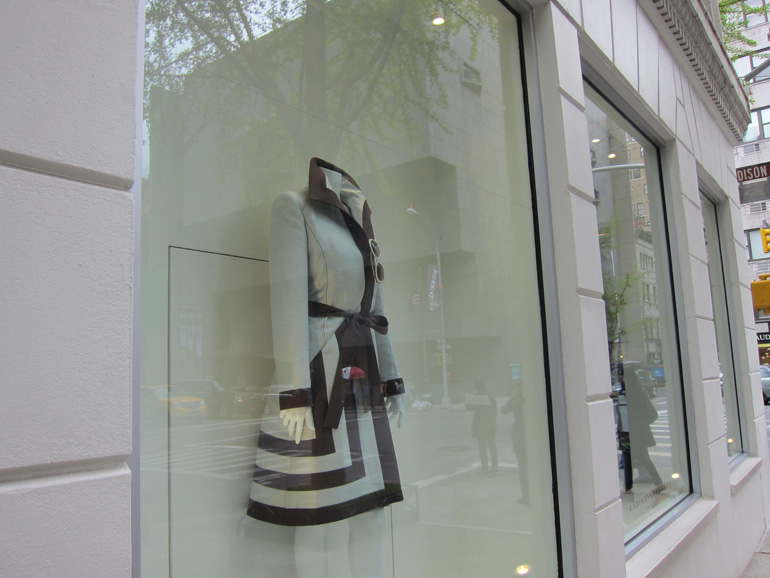
Friday
The weekend will be bracketed by parties. This evening, we celebrate Kathleen’s birthday as well as that of an old friend, here; and, on Sunday, we cross town for an Open House on Riverside Drive — an old classmate of Kathleen’s has redone her apartment.
I hope to finish Donna Leon’s Beastly Things, which I’ve been rating as better-than-average Brunetti, probably because Signorina Elettra figures prominently. Not only that, but Vianello, Brunetti’s most trusted colleague, insists on commiserating, if that’s the words, about the signorina’s almost certainly illegal Internet searches: the worst of it is, he says, that, like serial murders, he and Brunetti have come to enjoy this criminal activity. Readers certainly do. Signorina Elettra is a sort of porn goddess of information. Elegant and elusive, she will produce, for her faithful acolytes, everything that there is to know about businessment and politicians. If she worked for a newspaper, it would collapse in a month, from sheer flagrancy. Leon’s ironic achievement is to make an Orwellian police force appear to be benign. Â
***
The desserts are here, and the salmon mousse is in the fridge. I’ve got a few things to do today, but I’ve tried to make it easy on myself. We will be eight at table: the maximum. The three ladies are all slight, but four of the five men are not, and it will be a jolly squeeze. I’ve planned four courses: a pea and lettuce soup; the mousse, with a salad of endive, apples, and Roquefort; a beef tenderloin with béarnaise, and sweet potatoes; and finally the two cakes from Greenberg.
When I went to pick up the cakes yesterday, the assistant said to me, “Oh, Mr Keefe, I called you; we have a problem; the cakes will be late.” At the end of a bit of hemming and hawing, the assistant said that she would drop off the cakes on her way home. I don’t think that this unexpected offer was motivated by umbrage on my part, but sometimes, just standing there, I can look pretty fierce. I made it a point to be near the phone toward the end of the afternoon, and shortly after four, it rang, and the assistant told me that her “boss” was going to swing by in her car and leave them with the doorman. I gathered up my keys and my book and went down to the lobby at once. I stood there for ten rather uncertain minutes, wondering if the subway construction would make pulling into our driveway difficult. I alternately read and fretted in little bits. But when a dark SUV stopped at the door, I could see the top of a Greenberg shopping bag perched next to the driver, whom I approached before she could get out of her car. Her passenger side window was up, so she couldn’t hear me when I asked if she was dropping off the cakes to which I was pointing. She shook her head sweetly but briskly, the sensible standard way of dealing with officious madmen in New York. But I persisted. Eventually the window was lowered. When I repeated my question, eyebrows shot up and I was asked if I was Mr Keefe. It occurs to me now that I could have simply said that I was. Which of course I did. The cakes were handed over.
The tenderloin has just been delivered.
***
I’ve just embarked on the seventh novel of Elizabeth Taylor. Not her seventh, but the seventh to read. I’ve chosen A Wreath of Roses, largely because Lauren, at Crawford Doyle, remarked yesterday that it may be her favorite. The fact that it was written before Angel was also a factor in my decision. Angel, something of an outlier in Taylor’s oeuvre, makes a convenient divider between the early novels, which are shadowed by the sickly pall of postwar austerity, and the late novels, in which the exuberance that followed is seen to have deracinating effects. For a good part of yesterday, I read The Soul of Kindness, a later novel by these lights, and it ministered to my convalescent soul, recovering from the previous night’s chute of despair. I cannot say that yesterday was a wretched day, but it was not a happy one, not until I really understood what Mrs Folley’s love-letters were all about. In The Soul of Kindness, Mrs Folley is a housekeeper who presumes to read “recently rediscovered” love letters, ostensibly addressed to her younger self, to her employer, a well-born woman who finds herself adrift after the marriage of her beloved daughter, Flora (“the soul of kindness”). Mrs Secretan, the employer, is horribly embarrassed by these readings, not only because of their fatuous effusions but because she can “recognize the handwriting.” At first I took this to hint at terrible infidelities on the part of someone dear to Mrs Secretan, but in time the fog lifted, and I saw who the author really was, and when I did I couldn’t stop laughing for ten minutes. The laughter came in involuntary barking bursts, like hiccups; each convulsion emptied my mind, but only for a moment, as the lunacy of Mrs Folley’s folly quickly flooded it again, prompting another exclamation. Of course I was also laughing at my own thickness.
Saturday
There’s a lot to be said for hosting a dinner party on a Friday night, especially if Saturday is your day for tidying up the house. I’ll be at it all day, cleaning up and tidying, but I’m in no hurry, and I’ve resolved to leave more of the dirty work to the dishwasher, which certainly takes its time.
Kathleen had a wonderful evening and thought that the party was a great success. I think that it would be have been much more pleasant if I had thought through where to put the bar. Poor planning had me carving the tenderloin and slicing the cakes on a tray table at an odd angle to my chair; poor Ms NOLA, sitting to my right, was very inconvenienced, not to say alarmed that something might tip off the edge of the rackety workspace. All that slicing could have been done at the sideboard, by the kitchen door, but I had foolishly set up the bar there, when it ought to have been on the writing table in the living room.
Other than that… the béarnaise sauce broke in the making, but I patched it back together with additional egg yolks. Everything else more or less prepared itself. The ring of salmon mousse, filled with a salad of apple, endive and green onion that was dressed with nothing more than roquefort and the juice of an orange that had been lying about and getting in the way on the counter, would make a very nice luncheon dish or perhaps even a late-night supper, with nothing needed but a crusty loaf. The pea soup was too thick, porridgy even, but it tasted spring-like. The roast was done to a turn and tasted every cent of its five-figure price (I exagerrate slightly). The sweet potatoes — I’m in danger of overdoing them, making them too often. They’re frightfully easy and they taste like dessert, but anything can be overplayed. I had meant to steam some Yukon Golds and then, after ricing, pipe them into duchesse potatoes, but that would have stretched my logistics and risked ruining everything.
As Kathleen and I waited in the foyer for the guests to arrive — how nice it was to have Kathleen there with me, the first to arrive perhaps but not a guest — I thought that, if I sat down, I should never stand up, and that, when I did stand up, I would forget how to serve dinner. In the event, I was revived by the rush of talk with which the party began. And, when everybody left, I had the vigor to fill the empty dishwasher and get the clean-up going.
***
I had to fight back tears at the end of Beastly Things, Donna Leon’s latest and, I think, greatest Commissario Guido Brunetti Mystery. The scene was tremendously affecting, loaded with pathos. I was sorry to close the book; I had enjoyed reading it very much. Especially the part that I read yesterday at lunch.
Before beginning the day’s preparations for the evening’s party, I treated myself to lunch at the Seahorse Tavern, which is tucked just off Second Avenue on 85th Street. The high-rise apartment building across the street was built in the era of public spaces; its foundations stand well back from the curb, and the public space is planted with so many trees that, from a table in the open French door of the tavern, I could imagine an Italian piazza, perhaps even a Venetian camp. The day was so lovely and the traffic so slight that I could even imagine that 85th Street itself was a canal. Although wrapped in the book, I was not unaware of pleasant surroundings. And I noticed right away that a woman passing by was detouring toward me. She was a handsome woman younger than myself, carrying two shopping bags; she reminded me very much of one of Kathleen’s old summercamp friends. She smiled at me and said that she had just “this very minute” bought the book I was reading; was it as good as the others? I said that it was great, and that, in keeping with Leon’s issue-oriented writing, the new book was about slaughterhouses. “Can’t wait,” she said, and was on her way. Only then did I think what I ought to have said, which is that Signorina Elettra is back. She never really went away, but I missed her in the more recent books.
Here is a passage that made me stop and think, while I was enjoying lunch on the rio 85imo:
The softness of the late afternoon encouraged him to walk in the vague direction of San Polo, turning or stopping where whim indicated. He had known this part of the city decades ago, when he took the train daily to Padova to attend his university classes and chose to walk back and forth to the station because it saved him — how much had it been then? — the fifty lire of boat fare. It had been enough for a sweet drink or a coffee; he recalled with the affection age brings to the weaknesses of youth that he had chosen coffee only when with his classmates, giving in to his normal preference for sweet drinks when alone and there was no one to judge his choice unsophisticated.
For a moment, he considered stopping for one of those drinks, if he could only remember their names. But he was a man and had laid aside the things of childhood, and so he stopped for a coffee, smiling at himself as he poured in the second envelope of sugar.
The Biblical reference struck a scolding note, I thought at first, as though Brunetti were obliging himself to pretend to forget the names of those sweet drinks. But I looked at it again and the note did not strike; I saw what it was to lay aside childish things. It means to forget them — in effect, to lose them forever. (Proust’s madeleine is of course a reminder that old memories can be surprised into life by circumstances, but that is something else.) When I was growing up, from the age of seven until who knows when, I was very anxious about becoming a man; when would it happen, and how would I know. In a way, it never did happen; then it was seen to have happened. Very much like going to sleep.
Sunday
A dreary day. Kathleen has been working full time on her small computer, trading the convenience of three screens at the office for that of staying home. We shall be attending this evening’s party on the early side, as we must leave early for dinner with a business friend of Kathleen’s who is in from London. I thought about working in the kitchen, straightening some cabinets and taking stock of the refrigerator, but it seemed wiser to give myself a break after Friday’s party and yesterday’s cleanup (which took a full five hours). It was also more agreeable to read, and to finish, A Wreath of Roses, Elizabeth Taylor’s “dark” novel.
The principal scene of this novel is the country cottage of a woman at the end of middle age who happens to be a highly-regarded painter. Every summer, two women come to spend their holiday with her, one of them her charge from governessing days (we are reminded that Taylor herself was a governess, before she married), and the other that charge’s friend from Swiss boarding school. The younger women would have to be in their thirties, because they’ve been enjoying this annual gathering for a very long time. But now everything is different. One girl has married and had a baby. The other is retracting into spinsterhood. And Frances, the painter, finds herself passing, as introducer Helen Dunmore puts it, from “self-sufficiency to the weakness of old age.”
It is when Mrs Parsons pays her weekly housecleaning visit, “to do the rough,” that we get a finest picture of Frances.
So intent was she on being a normal elderly woman, so much trouble did she take, that she would always rather be praised for her crab-apple jelly than her painting, for the first was a marvel to her, the other natural to her and inevitable. Detesting the artists she had met and the milieu in which they usually worked she painted at set hours and did the washing-up first, remembering always Flaubert’s advice to artists — “Be regular and ordinary in your life, like a bourgeois, so that you can be violent and original in your works.” She would have been distressed beyond measure and bewildered if she had known how extraordinary the villagers thought her, or how Mrs Parsons on Saturday nights at the pub, spoke of her as “my poor dear lady,” pitying her, or told stories of her little mad kindnesses, her presents of money, of dried herbs, of cowslip wine, of jars of honey, of advice: how she had searched the snowy fields one winter’s night, hearing a rabbit crying in a trap, and had given her dinner to the dog when she was short of meat and eaten bread and marmalade herself. These actions, so natural to Frances that she would never have believed that ordinary people would behave otherwise, were enough to set the stories circulating, but she remained quite ignorant of them, and when Mrs Parsons took her arm, she thought it a gesture of simple kindness, not protection.
A Wreath of Roses reads more like Ivy Compton Burnett than any other Taylor novel that I’ve encountered (and this was my seventh out of the twelve); the dialogue is studded with deadpan retorts in which the elements of an initial comment are rearranged to in the form of an objection. The novel is also a tribute of sorts to To the Lighthouse; Frances and her admirer, Morland Beddoes, share wise and wry observations, never as bitter as Lily Briscoe’s but just as detached from the narrative current. (Well, they are the narrative current.) And with the fugitive Richard Elton, Taylor palpates the madness of Septimus Smith.
***
Things are said to come in threes, but I’ll be very happy to stop at two. First, one of the alabaster lamps in the living room seemed to have fused during the night, and then a glass canister slipped from its perch on a plastic one and shattered on the kitchen floor. I believe that it contained powdered milk, used for baking bread — yet another of those special ingredients that fill the mouthwatering pages of the King Arthur catalogue. I haven’t baked bread in a while; I quite lost the rhythm last summer, not only because of the month on Fire Island but because Will stopped being able to sit through dinner. Sweeping up the shards along with the powder, I saw that I must let go of another useless notion, which is that a kitchen ought to be well-stocked with staples. Although I’ve cut back greatly on the number of canisters and other storage containers, I still have too many.
The leftover tenderloin (which wasn’t as expensive as I thought it would be; I saw the bill when I upacked the calf’s liver for last night’s dinner) makes the most delicious sandwiches, sliced very thin and spiked with a bit of Wisconsin Buttermilk Blue, which is the cheese that I used in Friday’s night’s salad (not Roquefort), tucked into a toasted English muffin. Indeed, I think that I’ll go have one now.
***
What’s better than a two-bedroom apartment in a classic prewar building on Riverside Drive? Two apartments. one atop the other. And not only that, but one just below the treetop line and one just above it. At this time of year, the lower floor gives out onto a Parisian scene; the Bois de Boulogne might be stretching beyond the foliage. The view from the higher flat stares straight into the Hudson and out over the Palisades. Our friends have had the downstairs apartment for years; the death of an owner directly overhead made expansion possible. Divulging further, even more remarkable features would be an invasion of privacy, but, frankly, the view is all you need to think about. Â
Later, at Nice-Matin, having dinner with a friend who’s in town from London, we looked out and wondered if someone was making a movie. It was raining that hard. But we managed to get home without getting too wet.

















